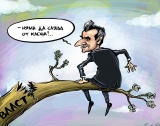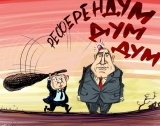АБОНАМЕНТ ЗА НОВИНИ [X]
BBC: Търпението на българите свърши
 14:15 | 17.07.2013
14:15 | 17.07.2013 1626
1626  коментари 0
коментари 0
Никога и по никакъв начин не съм споделял тезата, че има нарастващи протести в България, и не съм се съгласявал с нея. Това каза пред Агенция „Фокус” вицепремиерът и министър на вътрешните работи Цветлин Йовчев, по повод публикация в BBC тази сутрин. "Второ, никога не е ставало въпрос за „план на правителството”, който да е насочен към „справяне” с протестите", каза министърът на вътрешните работи Цветлин Йовчев.
По-рано излезе публикацията „Patience running out in Bulgaria”. Протестиращи българи изпълват улиците на София всяка вечер, но след 35 последователни дни на протести тяхното търпение към правителството на Пламен Орешарски вече се изчерпва, коментира авторът Nick Thorpe. Вътрешният министър на България Цветлин Йовчев обаче казва, че основното искане на протестиращите няма да бъде изпълнено. „Оставката на правителството би довела до задълбочаване на кризата”, казва министърът. Той обаче признава, че настоящият застой в отношенията между държавата и улицата не може да продължи. „Ако позволим протестите да продължат дълго и тези хора да не могат да видят истински механизъм, който би разрешил проблемите им, това би било първата стъпка към радикализацията”, казва още Йовчев.
Както правителството, така и самите демонстранти се опасяват от радикализиране на уличните протести. „Най-голямата група протестиращи са тези, които отиват спонтанно на демонстрациите в знак на протест срещу липсата на представителство в тази политическа система и срещу липсата на правосъдие. Трябва да слушаме внимателно тези хора и да подкрепим правото им на протест”, посочва Йовчев. Според него обаче има и друга група протестиращи, които се стремят към насилие. Демонстрантите осмиват правителството като „коалиция” от социалисти, либерали и крайни националисти. Преди всичко обаче, правителството изглежда отслабено от липсата на съвместен план, който да бъде представен на нацията. „Засега нямаме ясен план”, казва със забележителна откровеност вътрешният министър. Кабинетът смята, че провеждането на нови избори би довело до същата безизходица в парламента, но според коментатори няма гаранция, че това ще се случи.
Continue reading the main story
“Start Quote
Bulgarian Interior Minister Tsvetlin Yovchev At this moment there is no clear plan” Tsvetlin Yovchev Interior minister "A possible resignation of the government would result in a deepening of the crisis and the country would go into a spiral," he tells me. But he admits the current stand-off between the state and the street cannot continue. "If we leave the protest so long... and these people cannot find a real mechanism to resolve their problems, this is the first step to radicalisation."
Fear of violence One of the frustrations for the government is that the protests have no obvious leaders for them either to negotiate with, or to blame. Many groups have sprung up which brainstorm ideas on social media sites and organise specific actions, to mock the government, thank foreign ambassadors who sympathise with them, or simply to entertain their fellow protesters. "There are three reasons why this government's chances of survival are slim," says Daniel Smilov of the Centre for Liberal Strategies. "The longevity of the protests, the unity of the protesters behind a single demand, and the popularity of the protesters in the country." The latest survey suggested 58% agree that the government should resign - protest organisers claim that is a gross underestimate. Both the government, and the protesters themselves, fear a radicalisation of the streets. "The most important group of people are those who spontaneously go to protest against their lack of representation in this political system, and against... a lack of justice," says the interior minister. "We should listen very carefully to these people and support their right to protest." But there is another group, he alleged, which is looking for violence. A facebook event organised in front of parliament this Thursday, the birthday of the 19th-Century revolutionary, Vasil Levski, is advertised under his slogan: "The patience of the people has reached the point of no return." A comment attached to it by a respondent calling herself Muffin Dinosaur says: "I will do everything to come. Go there and beat the crap out of them." One, Tichomir Gergov, adds: "I'm coming with a baseball bat."
Lack of a plan In February, the previous, centre-right Gerb government was toppled by protests, which began over high heating bills, and grew into a wave of discontent with the whole ruling elite. There are big differences, but also similarities, between the protests then and now.
A protester gestures atop a garbage bin with the word 'Resign!' on it Ostavka! (Resign!) is a word written everywhere in Sofia, even on the sides of municipal rubbish bins In February, those on the street were poorer, and more desperate. Now they are better-off and more confident. There is more humour now. The wave of self-immolations, which claimed the lives of six Bulgarians, is over. What the winter and summer protests have in common is a disgust with politicians and businessmen in each others' pockets. A number of scenarios are emerging which could end the stand-off. Cracks have appeared in the parliamentary parties which support the fragile government. The French and German ambassadors made a joint statement criticising the government. The president says he has lost confidence in it. The US, British and other ambassadors are busy behind the scenes. There is disquiet in Brussels, and in the Party of European Socialists, that a Socialist-backed government is held in place by the vote of the far-right Ataka party. Protesters mock Plamen Oresharski's government as a "coalition" of socialists, liberals and extreme nationalists". Above all, the government seems weakened by the lack of a joint plan to present to the nation. "At this moment there is no clear plan," the interior minister admits, with remarkable honesty. The government argues that new elections would just produce a similar stalemate in parliament. Commentators suggest that is not necessarily true. They say a lowering of the electoral threshold to allow more parties into parliament would allow better representation, more coalition options. And that the broad use of the remarkably fast internet in Bulgaria would allow citizens to switch their skills from monitoring the state, to participating in democracy. Also, that a strict ethical code to split rich businessmen from politics - the "mafia" which protesters claim runs the country - would help bridge the gap between those in power, and the people. снимка:Facebook
| Tweet |
|













